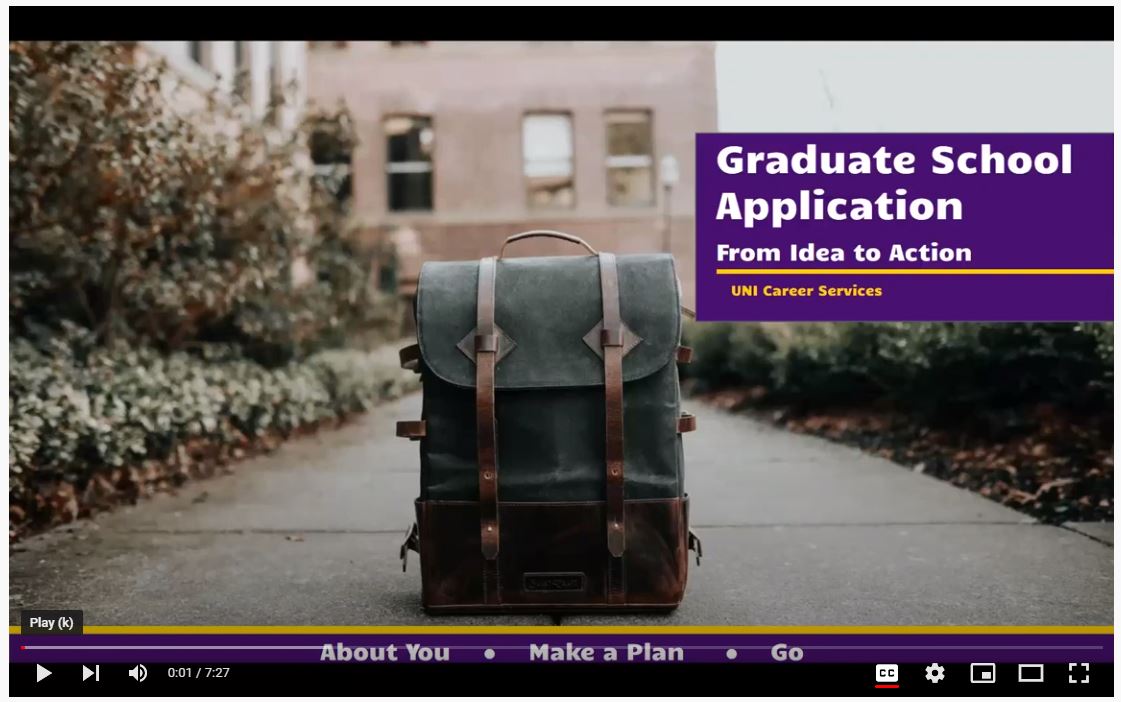Further Your Education
Graduate School Preparation
Graduate school and professional school are great options for students looking to advance their degree and career after earning a bachelor’s degree. It helps you specialize in a specific field and gain deeper knowledge and skills. There are two main types of graduate programs:
- Master’s Degrees: Typically 1-3 years, offering specialized skills and knowledge (e.g., MA, MS, MBA).
- Doctoral Degrees (PhD): Focus on research and expertise, often taking several years to complete.
Graduate school opens doors to advanced careers, higher salaries, and the chance to make an impact in your field. Because programs have different application structures and timelines, Career Services can help students wherever they are in the process!
Application Materials
Applying to graduate school requires several key documents to showcase your academic background, goals, and qualifications. These materials typically include your resume or CV, a personal statement or statement of purpose, letters of recommendation, transcripts, and sometimes standardized test scores. Each component plays a critical role in helping admissions committees evaluate your fit for their program, so it's important to prepare them thoughtfully and thoroughly.
What is the difference between a CV and resume?
CV (Curriculum Vitae)
- Comprehensive
- More than 2 pages
- Chronological format within headings
- Headings are education focused
- Teaching experience
- Research experience
- Awards/Recognitions
- Publications
- May or may not contain bullet points, should never use paragraphs
A CV should be used when the candidate is applying to doctoral programs, higher education faculty jobs, or abroad jobs/experiences to name a few. It may be used for masters level applications if the experiences of the candidate are demonstrated well by the constraints of a CV.
Resume
- Concise highlight reel
- 1-2 pages
- Reverse chronological format within headings (other formats acceptable)
- Headings are experience focused
- Relevant work experience
- Other work experience
- Advanced skills
- Technical skills
- Bullet points focus on skills developed in each experience
A resume should be used when the candidate is applying for most jobs in the United States, masters level graduate school applications, and other experiences. Most undergraduate students will find a resume fits their needs best. Get a resume review done by emailing your Google Document to careerservices@uni.edu.
Researching Graduate Programs
Choosing the right graduate program is a crucial step in your academic and career journey. Here’s how to start:
- Explore Your Interests: Identify the field or specialization that aligns with your career goals and passions.
- Program Types & Degrees Offered: Understand the differences between master’s, doctoral, and professional degrees. (Example of degrees offered: MA, MS, M.Ed., MBA, MN, MD, JD, PhD, EdD, PsyD etc.)
- Accreditation & Reputation: Look for programs that are well-respected and accredited by recognized bodies.
- Location & Format: Consider whether you want to study locally, nationally, or internationally, and whether a program offers in-person, online, or hybrid learning options.
- Faculty & Research Opportunities: Investigate faculty expertise and research opportunities available in your area of interest.
- Transportation Options: Consider the availability of public transportation, parking, and proximity to campus or work sites when choosing a graduate program location.
- Field Work and/or Practical Experiences: Look for programs that offer hands-on learning opportunities, internships, or research projects to gain real-world experience in your field of study.
- Potential Advisers/Mentorship: Research faculty members who align with your academic interests and seek mentorship opportunities to guide your graduate school journey.
- Cost & Financial Aid: Be sure to research scholarships, assistantships, fellowships, and other funding options. Many programs offer substantial financial support that could qualify you for 'in-state' tuition or even cover your entire tuition! Taking the initiative to ask about scholarships, research funding, assistantships, and other financial aid can really help reduce your expenses. Find ways for the program to pay for YOUR degree!
Sources to aid your search:
- GradSchools.com
- Peterson's Grad School Search Tool
- University Website
- + Always check the professional organization related to your field!
Grad School Applications
Personal Statement
Starting can be the hardest part... but for a personal statement, sometimes that is what you need to do. We encourage students to do their research, know the prompts and start writing! Edits and drafts will continue to evolve.
For a backbone, students can utilize our Personal Statement Outline.

